
Aluminum vs Fiberglass Tent Poles: A Scientific Comparison
Get the rundown on 'Aluminum vs Fiberglass Tent Poles'. Weigh up the benefits to make an informed decision.
You're ready for your next camping trip. You've packed your backpack, checked the weather forecast, and planned your route.
But have you given any thought to your tent poles?
These humble parts of your camping gear play a crucial role in your outdoor adventure comfort, and the material they're made from can make a significant difference.
Choosing the right tent poles is more than just a matter of preference.
It's about understanding the science behind the materials – aluminum and fiberglass – and how their properties can affect your camping experience.
Let's delve into the world of tent poles and discover why this choice matters.
Disclosure: We only recommend things we’ve personally used or come highly recommended by trusted peers. Using one of our referral links might give us a small commission which helps support this website at no additional cost to you. If you’d like to learn more check out our disclaimer page.
Understanding Tent Poles: An Essential Camping Gear

The Role of Tent Poles in Camping
Imagine setting up your camp after a long day of hiking.
As you unroll your tent, it's the poles that give it structure and stability.
They're the skeleton of your temporary home away from home, supporting the fabric and providing shelter against the elements. Without them, your tent would be just a piece of cloth.
Tent poles need to be strong enough to withstand high winds and weather, light enough not to weigh down your backpack, and flexible enough to bend without breaking.
That's quite a lot to ask from a simple piece of equipment!
Common Materials Used for Tent Poles
When it comes to tent poles, two materials dominate the market: aluminum and fiberglass.
Both have their pros and cons, and both have their loyal followers among the camping community.
Aluminum poles are known for their strength and lightweight characteristics.
They're often found on high-end backpacking tents preferred by seasoned backpackers and mountaineers.
On the other hand, fiberglass poles are typically heavier but also more affordable, making them a common choice for casual campers and budget tents.
But what exactly makes these materials different, and how do these differences play out in real-world camping scenarios?
To answer these questions, we'll need to dive a little deeper into the science behind aluminum and fiberglass tent poles.
The Science of Aluminum Tent Poles
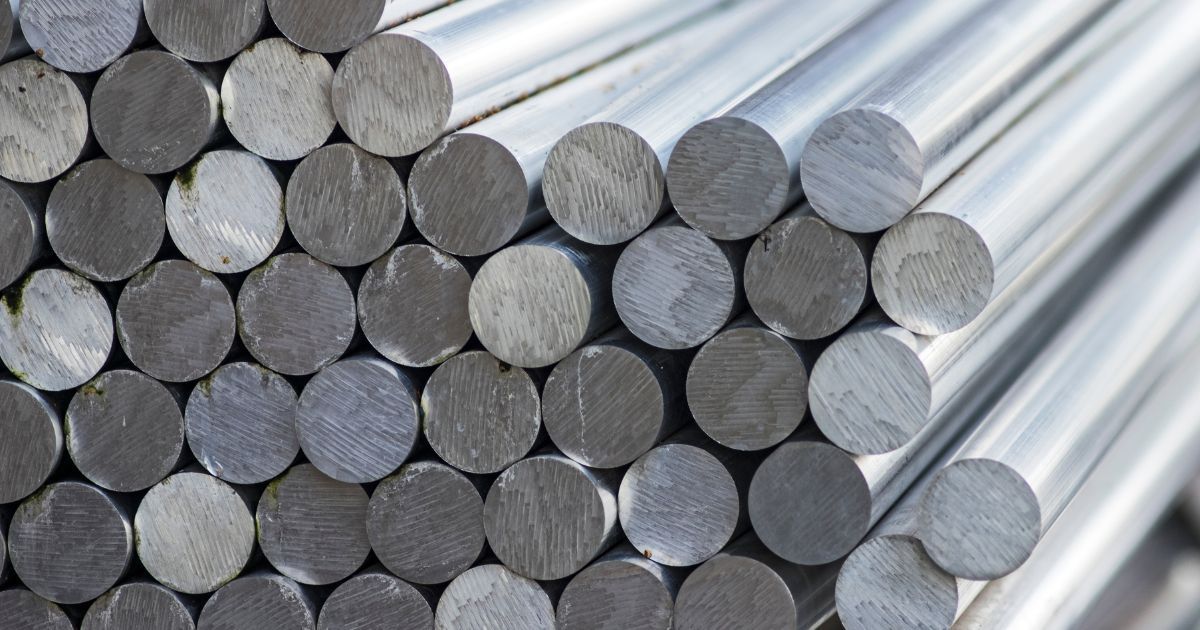
Key Properties of Aluminum
Let's start with the basics.
Aluminum is a silver-white metal known for its light weight and impressive strength.
Aluminum also has excellent corrosion resistance thanks to a thin layer of aluminum oxide that forms on its surface when exposed to air.
This layer protects the underlying metal from further oxidation, making it highly durable even in harsh outdoor conditions.
The Process of Making Aluminum Tent Poles
Aluminum tent poles are made through a process called extrusion.
In simple terms, this involves heating a billet (or block) of aluminum until it's malleable, then forcing it through a die to create a long, thin tube of the desired shape and size.
The tubes are then heat-treated to enhance their strength and durability.
Some high-end tent poles may undergo an additional process called anodizing, which thickens the protective oxide layer and can add color to the poles.
How Aluminum’s Properties Contribute to its Functionality as a Tent Pole
With its strength-to-weight ratio, aluminum makes for lightweight yet sturdy tent poles.
Its flexibility allows the poles to bend under stress rather than snap, a useful trait when you're battling strong winds in the wilderness.
The corrosion resistance ensures that your aluminum tent poles won't rust or degrade over time, even when exposed to rain, snow, or salty sea air.
This means they'll last longer and require less maintenance, saving you time, money, and hassle in the long run.
The Science of Fiberglass Tent Poles
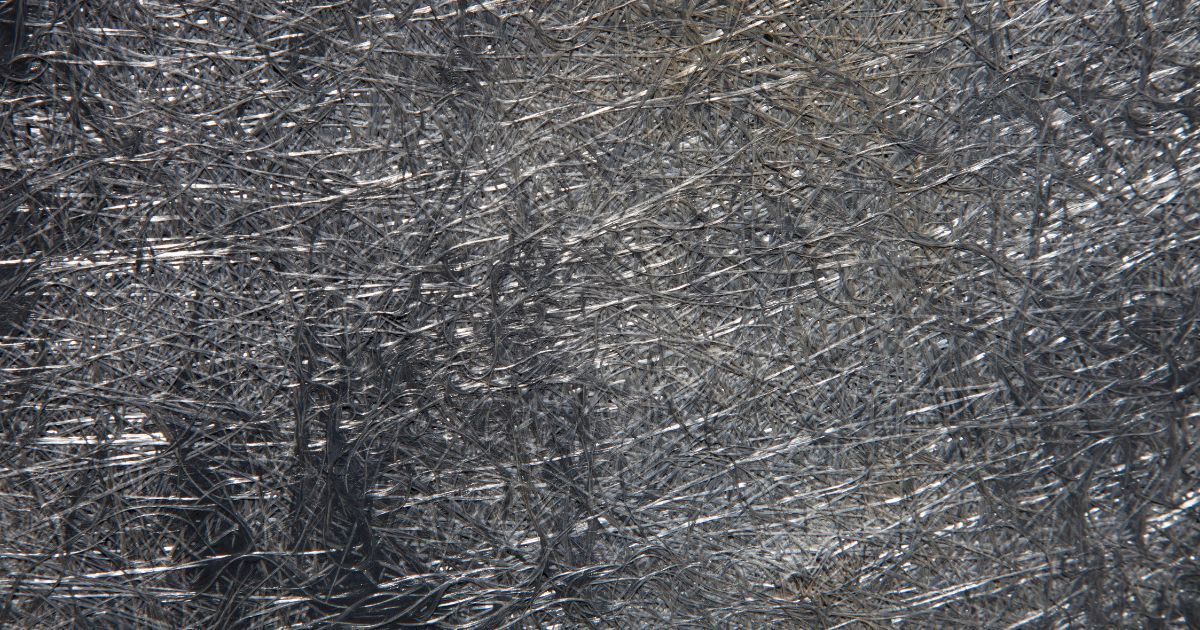
Key Properties of Fiberglass
Fiberglass, or glass fiber, is a type of plastic reinforced with small glass fibers. It's lighter than traditional glass and can be molded into various shapes and sizes, making it versatile for different applications.
However, it's generally not as strong or durable as aluminum, and it can become brittle over time, especially when exposed to UV light.
The Process of Making Fiberglass Tent Poles
Fiberglass tent poles are made by pulling molten glass through tiny holes to form thin fibers.
These fibers are then coated with a resin to form a composite material.
The resulting poles are lightweight and flexible, but they lack the strength and durability of their aluminum counterparts.
How Fiberglass’s Properties Contribute to its Functionality as a Tent Pole
The main advantage of fiberglass tent poles is their flexibility.
They can flex in the wind without breaking, providing stability to your tent in windy conditions. Their light weight also means they won't add much to your pack's overall weight.
However, their lower strength and durability mean they may not hold up as well under extreme conditions or heavy use.
And while they're generally cheaper than aluminum poles, they may need to be replaced more often, which could offset the initial cost savings.
Comparative Analysis: Aluminum vs Fiberglass Tent Poles
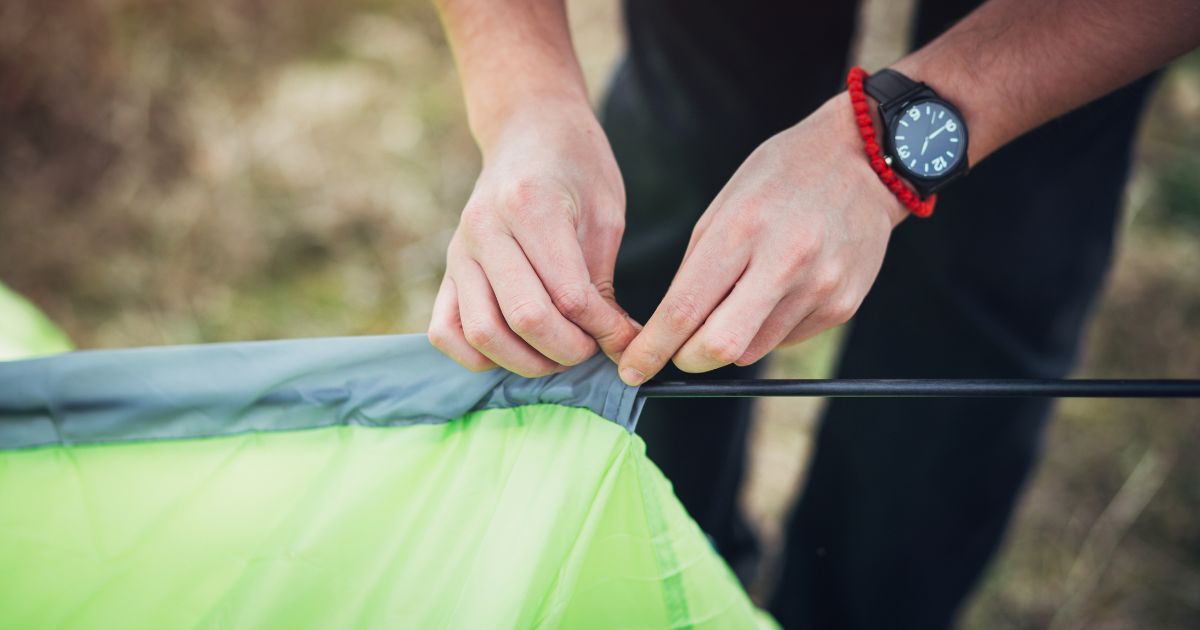
Let's dig deeper and compare these two materials on various parameters relevant to camping.
Strength and Durability Comparison
Both aluminum and fiberglass have their strengths, but aluminum comes out on top in terms of sheer strength and durability.
It's more resistant to wear and tear, less likely to snap under pressure, and generally more durable in the long run.
Fiberglass, while flexible, isn't as strong and can become brittle over time, particularly when exposed to UV light. A broken fiberglass tent pole can't be repaired and will need to be replaced.
So, if durability is a priority for you, aluminum might be your best bet.
Weight Comparison
When it comes to weight, aluminum is the clear winner.
It's significantly lighter than fiberglass, making it an excellent choice for backpackers who need to keep their packs as light as possible.
Fiberglass poles tend to be heavier, which might not be a problem for car campers but could be a deal-breaker for long-distance hikers.
Flexibility and Elasticity Comparison
Fiberglass is more flexible than aluminum, which means it can bend more before breaking.
This flexibility can be beneficial in windy conditions, where the poles need to flex with the wind rather than resist it.
Aluminum, while less flexible, has a higher elasticity. This means that when it does bend, it's more likely to spring back to its original shape instead of remaining deformed.
Corrosion Resistance Comparison
As we've discussed earlier, aluminum has excellent corrosion resistance, thanks to its protective oxide layer. This makes it more suitable for prolonged exposure to the elements.
Fiberglass doesn't rust or corrode, but it can become brittle and crack over time, especially when exposed to sunlight.
Practical Implications: What This Science Means for Campers

How These Scientific Factors Translate to Real-World Camping Situations
So, what does all this science mean for you, the camper?
If you're a backpacker or mountaineer who needs lightweight gear that can withstand harsh conditions, you'll likely prefer aluminum tent poles.
They're strong, light, and durable, making them well-suited for challenging outdoor adventures.
On the other hand, if you're a casual camper or on a tight budget, fiberglass might be the better option.
While heavier and less durable, fiberglass poles are more affordable and still offer good performance for less demanding trips like car camping.
Considerations When Choosing Between Aluminum and Fiberglass Tent Poles
When choosing between aluminum and fiberglass tent poles, it's essential to consider your unique camping needs and circumstances.
Here are some key aspects to think about:
Type of Camping
The kind of camping you plan on doing significantly influences your choice.
If you're a backpacker or mountaineer who often faces harsh weather conditions, you'll need something lightweight yet robust.
In this case, aluminum tent poles, with their superior strength-to-weight ratio, could be the ideal choice.
On the other hand, if you're a casual camper who usually sets up camp in mild weather and doesn't mind carrying a bit of extra weight, fiberglass poles may serve you well.
They are flexible, affordable, and can handle moderate winds quite efficiently.
Frequency of Use
How often you camp also plays a role in your decision.
If you're an avid camper who spends lots of time outdoors, durability becomes crucial. Aluminum poles, known for their longevity and resistance to wear and tear, would be a wise investment.
Conversely, if camping is an occasional activity for you, you might not want to invest heavily in tent poles. While not as durable as aluminum, fiberglass is the most affordable tent poles for the casual camper.
Budget
Budget is always a significant factor.
Aluminum poles are generally more expensive than fiberglass ones due to their superior properties.
However, they can be a cost-effective choice in the long run because of their durability and less frequent replacement needs.
Fiberglass poles are cheaper upfront, making them an attractive option if you're on a tight budget. But remember, they may need replacing more often, especially with heavy use or exposure to harsh environments.
Weight Carrying Capacity
If you're a long-distance backpacker, every ounce matters.
Aluminum tent poles, being lighter than fiberglass ones, can help keep your pack weight down. This could make a significant difference on multi-day hikes where you're carrying all your gear.
For car campers or those who don't have to carry their gear far, the weight of the tent poles might not be as crucial. In such cases, the heavier fiberglass poles could still be a viable option.
Environmental Conditions
Finally, consider the environment where you'll be camping.
If you frequently camp in coastal areas or places with high humidity, corrosion resistance becomes important. Aluminum's excellent corrosion resistance can withstand these conditions better than fiberglass.
In contrast, if you're camping in areas with intense sunlight, note that UV exposure can make fiberglass brittle over time. An aluminum pole might be a better choice for such environments.
Case Studies: Aluminum vs Fiberglass Tent Poles in Action
Let's look at how the science translates into real-world use by examining two specific tents – one with aluminum poles and one with fiberglass.
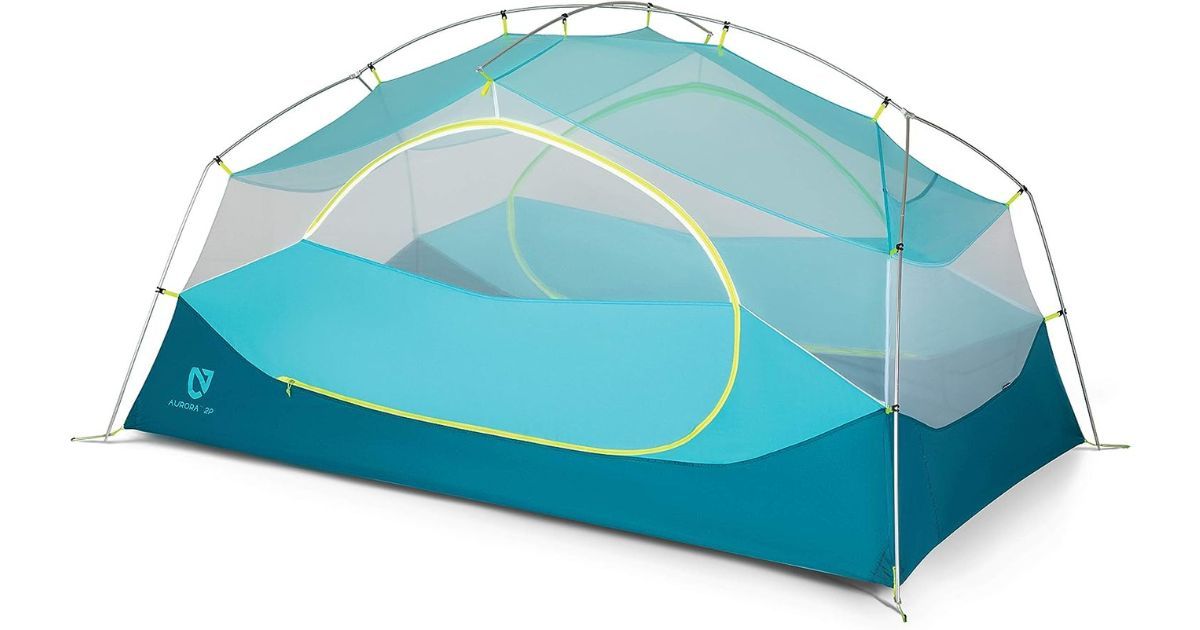
Nemo Aurora Backpacking Tent
The Nemo Dagger OSMO, a popular choice among serious backpackers, uses DAC Featherlite NFL aluminum poles.
These poles are known for their lightweight yet strong properties, which align with the scientific characteristics of aluminum we discussed earlier.
Users often praise the Nemo Dagger OSMO's durability and resilience in challenging weather, highlighting the strength of its aluminum poles.
This tent exemplifies how the properties of aluminum can contribute to high-performance camping gear.
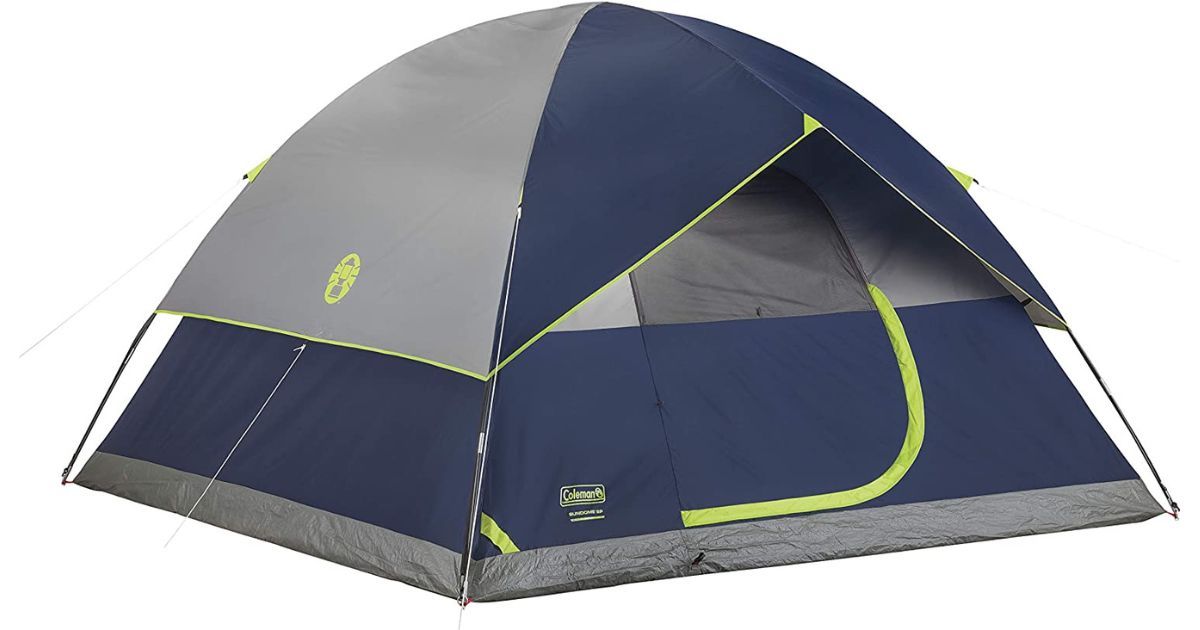
Coleman Sundome Tent
On the other hand, the Coleman Sundome Tent uses fiberglass poles.
This tent is popular among car camping tents and those on a budget.
Despite being heavier than aluminum poles, users find the fiberglass poles easy to set up and flexible enough to withstand moderate wind conditions.
However, some users have noted that the poles can become brittle and break after repeated use, particularly when exposed to sunlight – a characteristic that echoes the scientific properties of fiberglass.
Frequently Asked Questions
Are fiberglass or aluminum tent poles better?
Aluminum tent poles are generally better as they are stronger, lighter, and more durable than fiberglass poles. However, fiberglass poles can be a cost-effective choice for casual campers due to their affordability and flexibility.
Are fiberglass tent poles cheaper than aluminum poles?
Yes, fiberglass tent poles are generally cheaper than aluminum poles because they're made from synthetic material, not ore. However, aluminum poles often perform better and last longer.
What are the best tent poles made of?
The best tent poles are generally made of aluminum because they are flexible, durable, and lightweight.
However, Easton has recently introduced their new Syclone tent poles that are supposed to have the strength characteristics of aluminum and the weight characteristics of carbon fiber.
What tent poles are the strongest?
Carbon fiber tent poles are the strongest and lightest ones you can find. But, steel tent poles are also very strong, even if they are heavier. Steel is mainly used for large and heavy canvas tents.
Can you replace fiberglass tent poles with aluminum?
Yes, you can replace fiberglass tent poles with aluminum ones. Aluminum poles are often stronger and can be repaired if bent, while a broken fiberglass pole will need immediate replacement.
Do aluminum tent poles bend?
Yes, aluminum tent poles can bend if too much force is applied. However, they are strong and can often be repaired if they bend, unlike fiberglass poles that can crack or splinter.
Do aluminum tent poles corrode?
Yes, aluminum tent poles can corrode over time, especially if they are exposed to moisture or too alkaline or acidic conditions. However, many come with a protective coating to help prevent corrosion.
Bottom Line
Choosing the right tent poles is about more than just personal preference – it's about understanding the science behind the materials and how they affect your camping experience.
Aluminum and fiberglass, the two most common materials for tent poles, each have their strengths and weaknesses.
Aluminum is lighter, stronger, and more durable, making it suitable for long-distance backpacking and harsh conditions.
Fiberglass, while heavier and less durable, is more flexible and affordable, making it a good choice for casual camping and budget-conscious campers.
By understanding these scientific differences, you can make an informed choice that best suits your camping style, ensuring a safer and more enjoyable outdoor adventure.
Before You Go...





